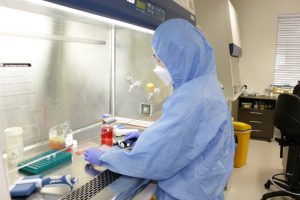 As attention is focussed on urgent research to find a vaccine or treatments for SARS-CoV-2, other medical research is likely to suffer due to the general disruption caused by the COVID-19 pandemic.
As attention is focussed on urgent research to find a vaccine or treatments for SARS-CoV-2, other medical research is likely to suffer due to the general disruption caused by the COVID-19 pandemic.
Institutions, researchers, ethics committees and sponsors are receiving guidance on contingency planning and how they might manage the potential impacts of COVID-19 on research, particularly clinical trials.
A joint statement from state and territory Departments of Health, the TGA, NHMRC and the Clinical Trials Project Reference Group (CTPRG) emphasises that “the safety and well-being of trial participants, other patients, family members, researchers and other clinical and support staff is paramount.”
Importantly, any new recruitment to ongoing trials should reflect the most current public health advice on social distancing and consider the likely burden on the health system.
“In a situation where a trial participant is unable to attend a visit or otherwise fulfil a condition of participation due to public health directives or government policy (such as restricted travel between states and territories), sponsors and researchers are encouraged to facilitate the participant being able to continue to participate in the trial at a site that is within the limits of any such restrictions.”
Use of telehealth for visits and electronic consenting, and extended protocol timeframes were some of the suggested modifications to trials.
In trials that proceed, with or without modification, patients should always be given the options to continue, suspend or withdraw their participation.
The statement also said that researchers and sponsors should educate themselves about novel approaches such as decentralised trials (i.e. teletrials) and hybrid models in which participants can be recruited and participate remotely and data can be captured remotely via available technology.
And, “PIs, pharmacies and sponsors, where relevant, should develop plans to manage the continuation of clinically essential trial medication delivery to participants affected by self-isolation quarantine periods or as a result of testing positive for COVID-19.”
The FDA has offered similar guidance to US researchers.
New focus on COVID-19 research
Meanwhile there is a pivot to fast track and coordinate COVID-19 research.
Locally, the NHMRC has advised that a number of grant schemes have been delayed, cancelled or had deadlines extended, due to uncertainty around staffing and resources and the need for “all hands on deck”.
On the other hand, a Respiratory Medicine Clinical Trials Research on COVID-19 program has opened through the Medical Research Future Fund. A streamlined application process closes 6 April 2020 and the NHMRC is actively recruiting experts to act as assessors.
Globally, Lilly has announced a pause on new studies and enrolment into ongoing studies unrelated to COVID-19. More drug companies may follow.
In the UK, the NIHR Clinical Research Network is “pausing the site set up of any new or ongoing studies at NHS and social care sites that are not nationally prioritised COVID-19 studies.”
“This will enable our research workforce to focus on delivering the nationally prioritised COVID-19 studies or enabling redeployment to frontline care where necessary.”
Protect research assets

Professor David Whiteman
Professor David Whiteman, acting director of QIMR Berghofer, told the limbic that all their research had been affected to some degree.